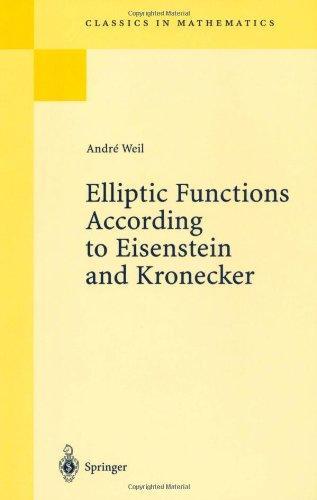

Download App
| >> | LShop | >> | Book | >> | Mathematics & Scienc... | >> | Mathematics | >> | Elliptic Functions A... |

Elliptic Functions According to Eisenstein and Kronecker
-
ISBN
:
9783540650362
-
Publisher
:
Springer
-
Subject
:
Mathematics
-
Binding
:
Paperback
-
Pages
:
104
-
Year
:
1217
₹
4685.0

₹
4685.0
Buy Now
Shipping charges are applicable for books below Rs. 101.0
View DetailsEstimated Shipping Time : 5-7 Business Days
View Details-
Description
"As a contribution to the history of mathematics, this is a model of its kind. While adhering to the basic outlook of Eisenstein and Kronecker, it provides new insight into their work in the light of subsequent developments, right up to the present day. As one would expect from this author, it also contains some pertinent comments looking into the future. It is not however just a chapter in the history of our subject, but a wide-ranging survey of one of the most active branches of mathematics at the present time. The book has its own very individual flavour, reflecting a sort of combined Eisenstein-Kronecker-Weil personality. Based essentially on Eisenstein's approach to elliptic functions via infinite series over lattices in the complex plane, it stretches back to the very beginnings on the one hand and reaches forward to some of the most recent research work on the other. (...) The persistent reader will be richly rewarded."A. FrAhlich, Bulletin of the London Mathematical Society, 1978Drawn from the Foreword: (...) On the other hand, since much of the material in this volume seems suitable for inclusion in elementary courses, it may not be superfluous to point out that it is almost entirely self-contained. Even the basic facts about trigonometric functions are treated ab initio in Ch. II, according to Eisenstein's method. It would have been both logical and convenient to treat the gamma -function similarly in Ch. VII; for the sake of brevity, this has not been done, and a knowledge of some elementary properties of T(s) has been assumed. One further prerequisite in Part II is Dirichlet's theorem on Fourier series, together with the method of Poisson summation which is only a special case of that theorem; in the case under consideration (essentially no more than the transformation formula for the theta-function) this presupposes the calculation of some classical integrals. (...) As to the final chapter, it concerns applications to number theory (...).












 4685.0
4685.0







